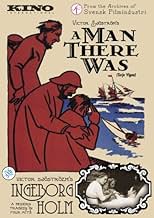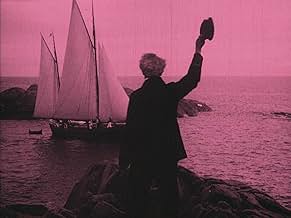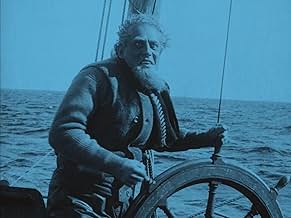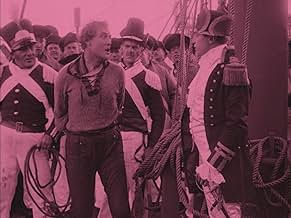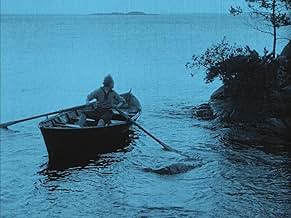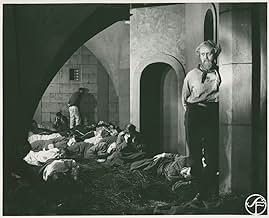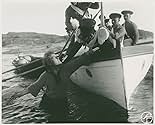Füge eine Handlung in deiner Sprache hinzuTerje Vigen, a sailor, suffers the loss of his family through the cruelty of another man. Years later, when his enemy's family finds itself dependent on Terje's beneficence, Terje must decid... Alles lesenTerje Vigen, a sailor, suffers the loss of his family through the cruelty of another man. Years later, when his enemy's family finds itself dependent on Terje's beneficence, Terje must decide whether to avenge himself.Terje Vigen, a sailor, suffers the loss of his family through the cruelty of another man. Years later, when his enemy's family finds itself dependent on Terje's beneficence, Terje must decide whether to avenge himself.
- Regie
- Drehbuch
- Hauptbesetzung
- En fiskare
- (Nicht genannt)
- En kvinna i byn
- (Nicht genannt)
- Den nya hustrun i Terjes stuga
- (Nicht genannt)
- Norsk fånge i fängelset
- (Nicht genannt)
- En av Terjes kamrater (1)
- (Nicht genannt)
- En fiskare på stranden
- (Nicht genannt)
- Engelsk officer i fängelset
- (Nicht genannt)
- En av Terjes kamrater (2)
- (Nicht genannt)
- Den nye mannen i Terjes stuga
- (Nicht genannt)
- …
- Self
- (Nicht genannt)
- En liten pojke
- (Nicht genannt)
- Mor med son i knäet
- (Nicht genannt)
- Vitskäggig gammal gubbe
- (Nicht genannt)
- En kvinna på stranden
- (Nicht genannt)
Empfohlene Bewertungen
The art of silent filmmaking is one somewhat lost in time, focusing almost exclusively on the visual language and cinematography - and in that department, Terje Vigen shines. It's such a beautifully shot movie and the slow pacing and long shots tell so much more than any words ever could.
The story itself is very well-written as well, and the actors do a good job of conveying the characters.
Overall, one of the most important and innovative films ever made!
Victor Sjöström Gives Birth to an undying formula of Forgiveness over Vengeance in the most expensive Swedish film of its time. "Ingeborg Holm" (1913) by Victor Sjöström had a huge impact on the Swedish audience as well as foreign audiences who were underestimating Swedish films at the time. With Terje Vigen, he made the most expensive Swedish film of the time and apparently kicked off the golden era for Swedish cinema. I have witnessed this compassionate formula of "forgiveness" in many movies made in the last 10 decades, including a film made in 2022. Recently, there was a Bollywood film called "Jalsa", which used the same formula, while the most acclaimed works based on the same formula in the past few years had to be "Rubaru Roshni" (2019) and "Kaanekkaane" (2021). Knowing Terje Vigen has set the formula is nothing less than a blessing. I mean, I can't name all those hundreds of films that used the same formula in this brief write-up, but come on, how can they all be termed great for copying it from an old, unknown film? So let's give credit where it's due. The film is about Terje, a sailor who suffers the loss of his wife and kid during the Napoleonic Wars of 1809. He is captured by a brutal British officer, which changes his life forever and leaves him all alone in the world. Will he get his revenge? That's where the kick is. I won't spoil it, but I guess you already know it. Victor Sjöström's trendsetter drama is full of life, tragedy, drama, and conflicts, and all are relatable. You can find yourself in Terje, especially when you assume it's anything before the 21st century. Apart from pioneering dramatic conflicts, Terje Vigen also set benchmarks for big-scale movie making at that time. Overall, another great film in Master Victor Sjöström's filmography.
RATING - 7.5/10*
By - #samthebestest.
The story is simple and revolves around Terje Vigen, a sailor, who suffers the loss of his family through the cruelty of another man. Years later, when his enemy's family finds itself dependent on Terje's beneficence, Terje then must decide whether to avenge himself.
When comparing Terje Vigen to its peer films of the 1910's such as L'Inferno (1911), From the Manger to the Cross (1912), The Straw Man (1914), Birth of a Nation (1915) and even the masterful Intolerance (1916), what stands out in Sjöström's film making is it's emotional impact rather than its production design or acting prowess. It is a mature depiction of human pain, suffering and redemption, that far succeeds its historical immaturity. Also particularly noteworthy is Rodulf Sahlberg's amazing score for the film.
Ii highly recommended it for film buffs and those interested in cinema history. Victor Sjöström's protegé, Ingmar Bergman would continue the beginning of the Swedish film making legacy in becoming one of cinema history's most revered directors.
The story is told in approximately one hour. Modern filmmakers could learn much from the economy and concision of these early features. The narrative is straightforward, simple and unadorned, with no padding or extraneous subplots, and the story is told most effectively. It uses title cards sparingly, and in a very interesting fashion. Lines from the original poem are displayed on the screen, then the action described in the lines takes place, and the viewer is able to follow from there.
The actors do fine work in this film. Sjostrom proves to be a fine actor in the lead role, imbuing his character with dignity, sorrow, tenderness, anger, and many other emotions. The supporting cast is also effective, particularly Bergliot Husberg as Mrs. Vigen. The actors show restraint and naturalism in their parts, largely avoiding the tendency towards big melodramatic gestures that marked contemporary theatrical productions.
Equally notable is the cinematography, which depicts both the beauty and the dangerous ferocity of the sea, as well as the starkness of the island landscapes. Sjostrom made very effective use of the Norwegian scenery, causing nature to become a character in its own right in the film. Tinting adds to the moody atmosphere. The camera is mostly stationary, according to the custom of the time, but the shots are very well composed, like paintings. In addition, the film is well edited, not allowing shots to go on longer than necessary.
This film was definitely very moving and memorable. TERJE VIGEN is a compelling and concise tale of the effects of man's inhumanity to man, and of the dilemmas that individuals face when tempted to cast compassion aside. It is rendered effectively through succinct scripting, heartfelt and naturalistic acting, and artfully composed cinematography. It is definitely a masterpiece of silent cinema. SCORE: 10/10
Wusstest du schon
- PatzerA title card references the year of the blockade as 1809. Great Britain and Sweden were allies in 1809, so there was no blockade. However, after she was forced to make peace with France after losing The Finnish War and the Pomeranian War, Sweden declared war against Great Britain. The Anglo-Swedish War (1810-1812) existed only on paper: British ships were still allowed to dock on the island of Hanö and trade with the Baltic states. Great Britain blockaded Sweden during World War I.
- Zitate
[first lines]
Title Card: On a barren, remote islet, there lived an odd, grizzled man.
- VerbindungenEdited into Spisok korabley (2008)
Top-Auswahl
Details
Box Office
- Budget
- 60.000 SEK (geschätzt)
- Laufzeit1 Stunde 5 Minuten
- Farbe
- Sound-Mix
- Seitenverhältnis
- 1.33 : 1
Zu dieser Seite beitragen



